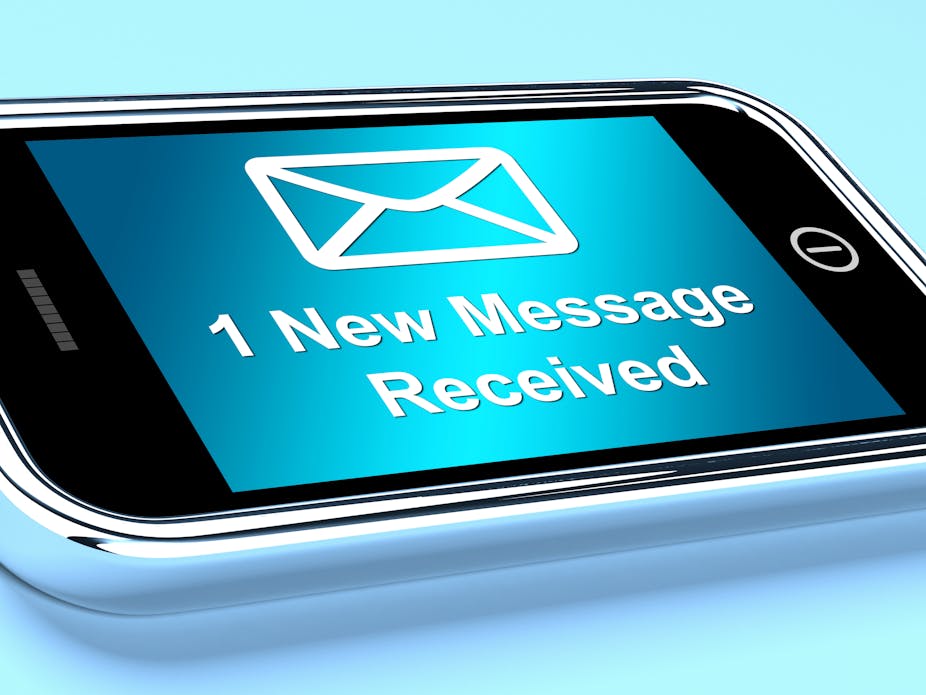For many of us, smartphones and laptops have enabled an electronic untethering from physical and temporal limitations workplaces, creating the opportunity for greater flexibility to fit paid work in and around other life activities such as family life, personal interests, community engagement and travel.
But whether technology has enabled greater freedom from the workplace is debatable. It is easy for working “anywhere, anytime” to turn into working “everywhere, all the time”.
In many ways, email is symbolic of this electronic transformation of work. At the UniSA Centre for Work + Life, we conducted a study investigating how Australians interact with their work email out of work hours – in the morning, evening and while on holiday.
We found that the majority of workers (65%) have the technology to check work emails anywhere and anytime. Frequent checking was predominantly reported by managers and professionals: nearly half of managers reported checking their emails a few times a day or more frequently when not at work, and around 30% of professionals joined them. Of these email-checkers, most did so at various times during the day. Around one in four managers and professionals check email before breakfast, and around one in five check emails on holidays.
When asked why they check work emails outside of hours, the most common reasons related to managing workload or work demands. Nearly 60% of email checkers said they liked to know what is happening at work, and nearly 50% said checking email out of hours helped them manage their work. Few did this for enjoyment. Similarly, very few reported their manager expected them to do so.
Our findings suggest that workers check emails outside of work hours as a workload management strategy that they chose to undertake. Indeed, most respondents reported that having “anywhere, anytime” accessibility to work email was helpful and efficient, with very few reporting this practice as intrusive or tiring.
Yet when we examined the association with work-life interference, very frequent (every hour or so) email checking in non-work time was clearly associated with increased work-life interference. While correlation is not causation, it can be suggestive of relationships of interest worthy of further thought and investigation.
We also found that for women, checking email before breakfast or while on holidays was associated with the highest work-life interference of all groups. But for men, the timing of email checking was not associated with work-life interference. Early mornings and holidays are often busy times, especially when children are involved.
In Australia, like most countries, it is often women who have primary responsibility for care and domestic work. It makes sense that that trying to multi-task by checking email at such times will exacerbate the ubiquitous “struggle to juggle”.
This survey was our first foray at the Centre into investigating how email is influencing Australians’ experience the interaction between their paid work and life outside of work. Perhaps even the notion of separate domains, work and non-work, is becoming outdated — some social commentators and futurists argue this is increasingly the case. In his 2010 book Hamlet’s Blackberry, William Powers reflects on the hyper-busyness of the “connected life”, a life in which technology has erased opportunities for downtime by enabling interaction with others anywhere and anytime. A phenomena which writer and critic John Freeman calls the ‘Tyranny of Email’.
Yet something more subtle is going on. It is about how email enables work to permeate through our waking hours – even when we are on holiday. It is about how technology in general, and access to email in particular, has facilitated the internalisation and acceptance of the demands of what sociologist Lewis Coser called “greedy institutions” that will consume as much of our time and effort as we will give.
In our survey, checking email outside of work hours was reported by respondents as a useful workload management strategy that they had embraced as individuals. This suggests an internalisation of responsibility to deal with an unreasonable expectations of communication and accessibility from what Coser calls “greedy institutions”, enabled by the 24/7 availability of email. This is hardly the utopian vision of technology-enabled freedom from the old spatial and temporal constraints of traditional workplaces.
What is not put forward here is a Luddite-esque reaction to new technology. I’ve composed this article working from home and emailed this contribution to an online news service; I am a beneficiary of email and other technologies. Rather, what is being argued is that we need to bring wisdom and mindfulness to our use of email (and other technology) as bosses, coworkers and customers. There needs to be getting of (collective) wisdom around how we can best use email and other technologies, these impressive products of our human intelligence, to ensure their application supports — rather than damages — our quality of life.
This study comprised a set of questions included an on-line survey conducted by The Australia Institute. A full report is available from the Centre for Work + Life website.

